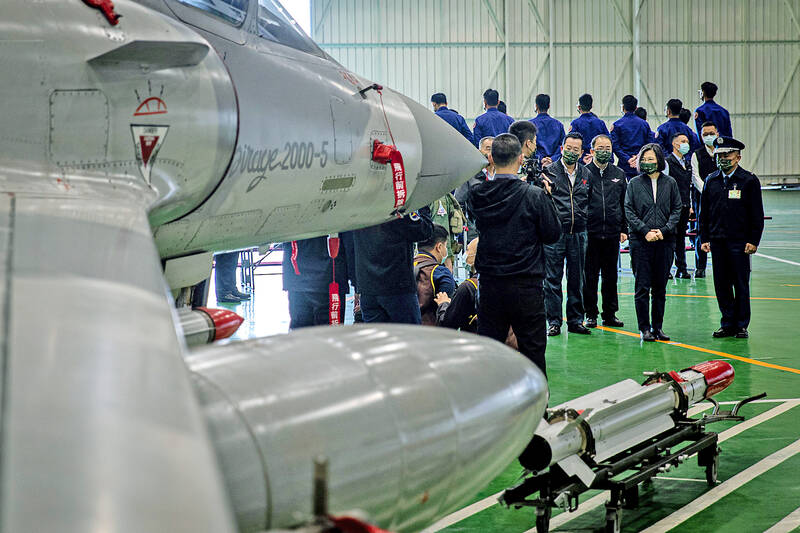Taiwan does not seek to escalate tensions or provoke conflict with China, but will resolutely defend its national sovereignty, President Tsai Ing-wen (蔡英文) said yesterday on a visit to troops in Hsinchu.
Tsai made the comment after observing an exercise by a battalion of the 542nd Armored Brigade at the army’s Northern Joint Testing Center, which she visited as part of a tour of northern military bases ahead of the Lunar New Year.
Tsai also toured the Second Tactical Fighter Wing and the Hsinchu branch of Taoyuan Armed Forces General Hospital.

Photo: Ritchie B. Tongo, EPA-EFE
The military thoroughly monitors and calmly responds to Chinese military activity in the waters and airspace surrounding the nation, while continuing to train and prepare for its defense, she said.
The government’s position is to not escalate or provoke conflict with China, while resolutely defending the nation’s sovereignty and security, she said.
Responsibility for maintaining regional peace and stability falls on both sides of the Taiwan Strait, she added.
The battalion-level tactical gunnery exercise utilized the army’s new laser-based engagement simulation system, which has significantly increased the effectiveness of unit training and wargaming, she said.
The military is updating training methods and equipment to match current military preparedness requirements, she said, adding that the reforms would be applied to the training of conscripts after mandatory military service is restored to one year.
The Ministry of National Defense is increasing the facilities, capacity and quality of military training to boost the effectiveness of the armed forces, she said.
Separately, the defense ministry has filed a request for the Executive Yuan to activate a secondary reserve fund of NT$917.34 million (US$30.19 million) to pay for soaring fuel and maintenance costs due to frequent deployments of Taiwanese ships and warplanes in response to Beijing’s military drills.
Continual probing of Taiwan’s sea and air defenses by the Chinese People’s Liberation Army (PLA) has strained military resources, especially ship and airplane fuel, a defense official familiar with the matter said yesterday on condition of anonymity.
The navy responds to suspicious movements of Chinese warships by approaching with an equal number of ships, a policy that puts the entire fleet on constant alert, the person said.
Beijing has sent warplanes into Taiwan’s air defense identification zone nearly every day for the past year, and the PLA Air Force has become more brazen in approaching or crossing the median line of the Taiwan Strait, the source said.
Chinese jets additionally conducted menacing flights from the north using air lanes Taiwan reserves for special purposes, the person added.
As the air force scrambles fighter jets to repel or intercept the Chinese aircraft, the number of flight hours have surged, resulting in pilot exhaustion and accelerated wear on the planes, they said.
These factors have led to skyrocketing fuel expenditures that exceeded the army’s fuel budget, while price hikes by energy exporters has worsened the situation, the source said.

The Taiwanese passport ranked 33rd in a global listing of passports by convenience this month, rising three places from last month’s ranking, but matching its position in January last year. The Henley Passport Index, an international ranking of passports by the number of designations its holder can travel to without a visa, showed that the Taiwan passport enables holders to travel to 139 countries and territories without a visa. Singapore’s passport was ranked the most powerful with visa-free access to 192 destinations out of 227, according to the index published on Tuesday by UK-based migration investment consultancy firm Henley and Partners. Japan’s and

NATIONAL SECURITY THREAT: An official said that Guan Guan’s comments had gone beyond the threshold of free speech, as she advocated for the destruction of the ROC China-born media influencer Guan Guan’s (關關) residency permit has been revoked for repeatedly posting pro-China content that threatens national security, the National Immigration Agency said yesterday. Guan Guan has said many controversial things in her videos posted to Douyin (抖音), including “the red flag will soon be painted all over Taiwan” and “Taiwan is an inseparable part of China,” while expressing hope for expedited “reunification.” The agency received multiple reports alleging that Guan Guan had advocated for armed reunification last year. After investigating, the agency last month issued a notice requiring her to appear and account for her actions. Guan Guan appeared as required,

Japan and the Philippines yesterday signed a defense pact that would allow the tax-free provision of ammunition, fuel, food and other necessities when their forces stage joint training to boost deterrence against China’s growing aggression in the region and to bolster their preparation for natural disasters. Japan has faced increasing political, trade and security tensions with China, which was angered by Japanese Prime Minister Sanae Takaichi’s remark that a Chinese attack on Taiwan would be a survival-threatening situation for Japan, triggering a military response. Japan and the Philippines have also had separate territorial conflicts with Beijing in the East and South China

A strong cold air mass is expected to arrive tonight, bringing a change in weather and a drop in temperature, the Central Weather Administration (CWA) said. The coldest time would be early on Thursday morning, with temperatures in some areas dipping as low as 8°C, it said. Daytime highs yesterday were 22°C to 24°C in northern and eastern Taiwan, and about 25°C to 28°C in the central and southern regions, it said. However, nighttime lows would dip to about 15°C to 16°C in central and northern Taiwan as well as the northeast, and 17°C to 19°C elsewhere, it said. Tropical Storm Nokaen, currently